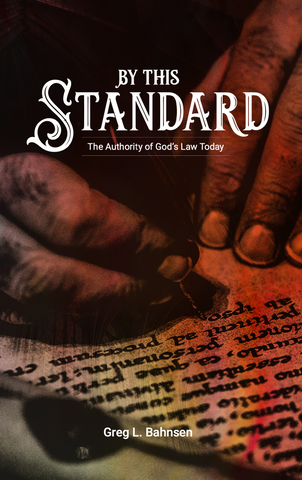Gary responds to a claim on Facebook that the Law has been fulfilled in Jesus (true), so we no longer need it (untrue).
The continuing authority of God’s law today is inherent to a biblically based theology. Time does not change or wear out the validity of God’s commands, and a change of geography or locality does not render them ethically irrelevant. With the coming of the New Covenant and the spreading of the church throughout the world, we still read in Scripture that the law of God is to be written on our hearts, and we are to disciple all nations and teach them to observe whatsoever the Lord has commanded. The Biblical doctrines of God, Christ, the Holy Spirit, and the Covenant of Grace all harmonize in pointing to the abiding validity of God’s inspired law.
If one takes a normative approach to ethics, a motivational approach to ethics, or a consequential approach to ethics, he is always brought to the same conclusion: God’s law is authoritative for contemporary ethics.
The norm which God has given to direct our lives and to define our sin is revealed in His law, a law from which we are to subtract nothing; since the Lawgiver has not altered His law—indeed, the Son of God has confirmed that law for His followers—it must remain valid for us today.
If we turn to the motivational approach to ethics, our concern will be to live in a way appropriate to our gracious salvation; we will want to be the kind of people who are characterized by faith and love. Scripture shows us that those who are grateful for God’s grace will strive to live in obedience to His commandments; rather than cancelling the commandments of God in ethics, faith establishes the law, and love is a summary of the law’s requirements. So then, a motivational approach to ethics—like the normative approach declares the current validity of God’s law.
Finally, the consequential approach to ethics evaluates actions and attitudes according to their beneficial results or comparative lack thereof. Christ teaches us in his word that the primary goal of our moral behavior is the kingdom of God; when we make it that, every temporal and eternal blessing will be ours. The righteousness of this kingdom is defined by the law of the King, and thus Scripture promises that obedience to the law of God will eventuate in outstanding blessing for ourselves, our neighbors, and our society. In short, the law of God was revealed for our good.

By This Standard
God's Law is Christianity's tool of dominion. This is where any discussion of God's law ultimately arrives: the issue of dominion. Ask yourself: Who is to rule on earth, Christ or Satan? Whose followers have the ethically acceptable tool of dominion, Christ's or Satan's? What is this tool of dominion, the Biblically revealed law of God, or the law of self-proclaimed autonomous man? Whose word is sovereign, God's or man's?
Buy NowGary responds to a claim on Facebook that the Law has been fulfilled in Jesus (true), so we no longer need it (untrue). Paul discusses using the law lawfully and that application of biblical law is still a necessary present reality. Otherwise, we have everyone claiming to be a “Spirit-filled” lawkeeper in their own eyes.

